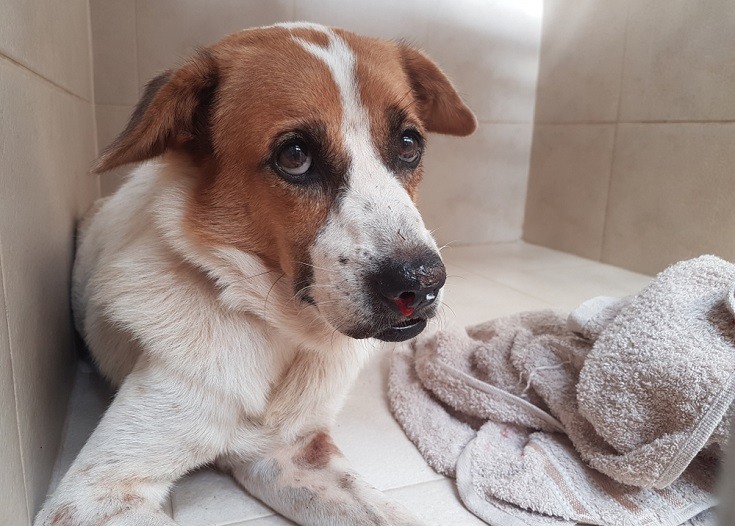Can Dogs Eat Candy Canes? Vet Approved Reasons & Facts
Updated on

It’s not unusual to find treats and sweets of all kinds lying around the house when the holiday season rolls around. But, of course, you know your dog isn’t allowed to participate in much of the food festivities as it can’t have chocolate, cookies, or those yummy cocktails you whip up. But what about candy canes? Since these peppermint treats are so easy to find in households worldwide during the holidays, you might wonder if offering your dog one as a special treat is okay.
Unfortunately, candy canes can pose many health risks for pets, so this is another snack you need to add to your “do not feed” list.
Keep reading to learn more about the risks of offering your dog a candy cane.
What Are Candy Canes Made Of?
Before diving deeper into the healthiness and appropriateness of candy canes for dogs, let’s look at what exactly a candy cane is.
Candy canes are hard candies, traditionally having a peppermint flavor. They are most commonly eaten during the Christmas season.
Candy canes are made primarily with white sugar. Other ingredients include water, corn syrup, extracts for flavoring, and food coloring. As mentioned, most traditional cane canes are peppermint, but they’re also available in a wide variety of other flavors like wintergreen, cinnamon, strawberry, and apple.
Sugar-free candy canes may be made with a sweetener like Xylitol instead of sugar.
Can Dogs Eat Candy Canes?
Dogs shouldn’t eat candy canes as they have zero nutritional value and can cause several health problems for your pup. Let’s look a little closer at the risks of candy canes for dogs.
1. Sugar or Sugar Substitutes

While sugar isn’t toxic for dogs, it is very unhealthy. Although a single candy cane made with sugar likely won’t cause much harm besides a sore tummy, eating a lot of them can cause several health issues for your dog. According to PetMD, sugar can cause upset stomachs, obesity, diabetes, and metabolic changes.1
Candy canes may be sweetened with Xylitol, a sugar substitute. Xylitol is toxic and potentially lethal when ingested by dogs. When a dog eats Xylitol, a large insulin release is triggered, causing the blood sugar levels to drop dangerously low. The sweetener can also cause liver damage or failure.
2. Sharp Points
As your pup eats the peppermint-flavored treat, it can fragment into sharp pieces. Think of candy canes like chicken bones, as they can cause the same kind of damage. As these razor-like pieces travel down your dog’s throat, they can seriously damage the esophagus and intestines.
3. Wrappers

Dogs may be smart creatures, but they don’t know that they must remove the packaging before eating something. So, if your pup gets a hold of a wrapped candy cane, it could potentially eat the entire thing—wrapper and all.
Plastic is obviously indigestible and can cause a lot of gastrointestinal upset as your dog’s body tries to digest this foreign object. In addition, the wrapper may cause an intestinal blockage or even adhere to your pup’s stomach lining.
4. Choking Hazard
Candy canes are not only sharp, but they’re hard, too. Dogs aren’t used to eating hard candies, so they don’t know how to eat them. As such, candy canes can lead to choking and obstructions.
What Do I Do If My Dog Ate a Candy Cane?

If you know that your pup has eaten a candy cane, we recommend calling your veterinary team to ask for advice. Chances are if they ate a small piece of a candy cane which doesn’t contain xylitol, they wouldn’t suffer any adverse effects, but it is always better to err on the side of caution.
If the candy cane is sugar-free or sweetened with Xylitol, you need to contact your vet or local emergency animal clinic immediately. Xylitol poisoning can start in as little as 20 minutes, so time is of the essence.
- Vomiting
- Lethargy
- Drowsiness
- Weakness
- Collapse
- Shaking
- Seizures
What Kinds of Treats Can I Offer My Dog?
The best treats for your dog have been specifically formulated for canines. That said, there are some human treats you can offer your pup occasionally if you want to share some of your food with your pet. These include things like:
- Pet safe peanut butter
- Pumpkin
- Blueberries
- Plain boiled chicken
- Eggs
- Carrots
- Sweet potato
- Salmon (not the skin)
Final Thoughts
Don’t feel like a Scrooge when you deny your pup any taste of your Christmas candy canes during the holiday season. These sweet treats should be designated as human-only snacks. So next time your pet is flashing you those adorable puppy dog eyes, reach for a bag of doggy treats or offer them one of those mentioned above safe human food options for dogs instead. A candy cane isn’t worth risking your dog’s life, especially because it’s unlikely that they’ll even enjoy the taste in the first place.
Featured Image Credit: AnastasiaKopa, Shutterstock















